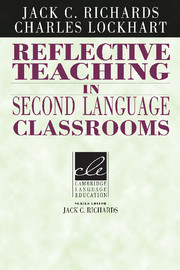Book contents
- Frontmatter
- Contents
- Series editor's preface
- Preface
- Introduction: Teacher development through exploring classroom processes
- 1 Approaches to classroom investigation in teaching
- 2 Exploring teachers' beliefs
- 3 Focus on the learner
- 4 Teacher decision making
- 5 The role of the teacher
- 6 The structure of a language lesson
- 7 Interaction in the second language classroom
- 8 The nature of language learning activities
- 9 Language use in the classroom
- Epilogue
- References
- Index
5 - The role of the teacher
Published online by Cambridge University Press: 29 January 2010
- Frontmatter
- Contents
- Series editor's preface
- Preface
- Introduction: Teacher development through exploring classroom processes
- 1 Approaches to classroom investigation in teaching
- 2 Exploring teachers' beliefs
- 3 Focus on the learner
- 4 Teacher decision making
- 5 The role of the teacher
- 6 The structure of a language lesson
- 7 Interaction in the second language classroom
- 8 The nature of language learning activities
- 9 Language use in the classroom
- Epilogue
- References
- Index
Summary
There are many factors that influence how teachers approach their work and which particular strategies they employ to achieve their goals. The contexts in which teachers work have an important influence on teaching, since different teaching settings involve teachers in different kinds of roles. For example, in some institutions teachers are fairly autonomous and are free to make decisions concerning course goals, materials, teaching methods, and assessment procedures. In other settings these kinds of decisions are made by a supervisor or program director, and the teacher is seen primarily as someone who carries out decisions that have been made by others. Even in situations where teachers have primary responsibility for how they teach, they may assume very different roles within their own classrooms. Some teachers see their role primarily in managerial and organizational terms. They spend a considerable amount of time planning their lessons, monitoring their teaching, and managing student learning and behavior to ensure that their goals are accomplished. Others see their role more as a facilitator, and believe that the best kind of lesson is one that arises out of the dynamics of the teaching-learning situation. In this chapter we examine the roles teachers carry out in their teaching institutions, the responsibilities that different kinds of roles create for teachers, the roles teachers assume in their own classrooms, and how these roles contribute to the teachers' teaching style.
The nature of roles
A role can be defined as the part taken by a participant in any act of communication (Ellis and McClintock 1990). In some interactions, roles are relatively fixed (e.g., doctor–patient or teacher–student) whereas in others, roles are temporary and open to negotiation.
- Type
- Chapter
- Information
- Reflective Teaching in Second Language Classrooms , pp. 97 - 112Publisher: Cambridge University PressPrint publication year: 1994



